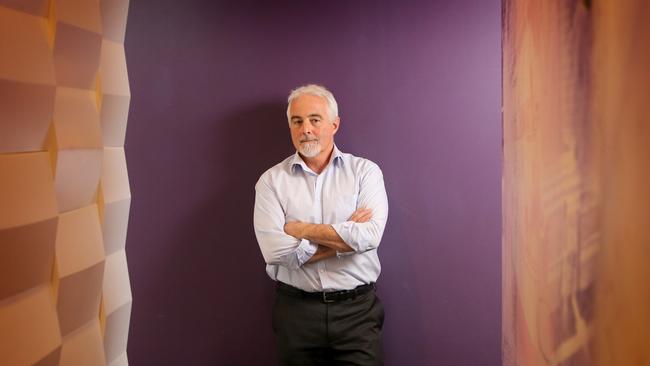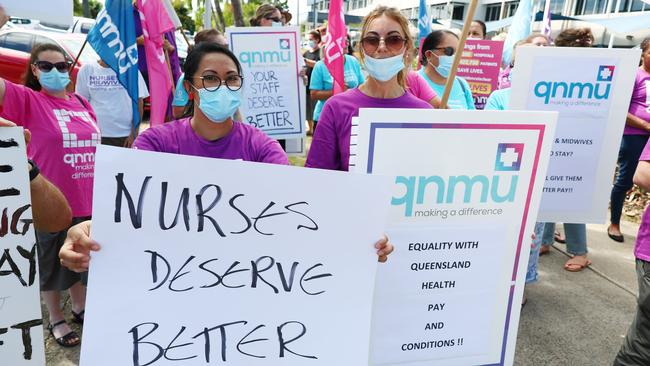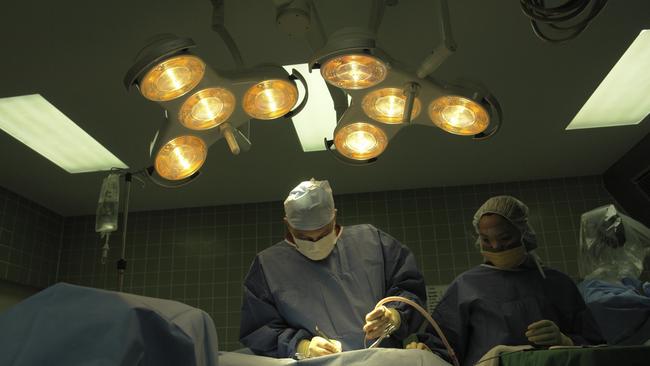Immigration isn’t the answer to nurse crisis, says Paragon Care chief executive Mark Hooper
Mark Hooper plans to lift Paragon Care to a $1bn company within five years, but he faces a big hurdle in realising that goal: staff to clear Australia’s elective surgery backlog.

Boosting Australia’s immigration intake will only partly solve the nation’s labour shortage in the healthcare sector and clear an “enormous” elective surgery backlog, says a veteran chief executive of ASX-listed health companies.
Mark Hooper – who led Australia’s biggest pharmaceutical wholesaler and chemist brand owner, Sigma Healthcare, for more than a decade before assuming the chief executive role of medical equipment and device company Paragon Care last year – says the federal government needs to make the healthcare sector more attractive to workers.
Mr Hooper said a shortage of theatre nurses and other staff was limiting Australia’s capacity to rebound from pandemic-fuelled elective surgery restrictions and clear an “enormous backlog”.
Australia was facing a nurse shortage before the pandemic: a federal government report forecast the shortfall to widen to 85,000 by 2025.
“There is this enormous backlog of elective surgery and nothing’s being done to actually take it out. Surgery levels are higher than they were obviously during Covid but they’re not at the level that’s meaningfully taking out the backlog in elective surgery,” Mr Hooper said.
“New Zealand has started proactively recruiting nursing staff from the Philippines. Filipino nurses who have gone to New Zealand have come to work in Australia, so New Zealand has become a funnel.
“I’m sure some of it (the nurse shortage) can be sorted out by immigration but longer term you need a different structural solution to it. They need to do something to fundamentally change the attractiveness of people going into healthcare.”

Mr Hooper believes he can turn Paragon into a $1bn company – a bold ambition, given such a feat would involve a six-fold increase of its current market value and its share price has dived 45 per cent in the year that he’s helmed the company.
This is despite Paragon expanding into Asia via its merger with Quantum Health and last month delivered increases of 38 and 24 per cent in interim revenue and net profit respectively. It has also maintained dividend yields above 5 per cent.
Still, investors have punished Paragon, and its shares have slid 25 per cent in the past month. Asked how this correlated with his strategy, unveiled at the company’s annual results last August, Mr Hooper is philosophical.
“Rebuilding credibility and rebuilding growth in the business takes a bit of time but I’m very confident that we can do it,” he said.
Rather than focus on driving organic growth, the company suffered from indigestion after going on an M&A binge – a course Mr Hooper is reversing.
“There’s always a healthy balance between those two. Organic growth is generally too slow if you’re trying to really grow aggressively – and if you do it all through M&A, which is historically how Paragon has grown, you end up with a balance sheet heavy with debt.
“Then you’re just constantly integrating new businesses you bought. In total, there’s something like 25-30 businesses that originally made up the Paragon group, so it’s the practical challenges of integrating another business rather than actually focusing on getting growth from what you’ve already bought.
“So I’ve quite consciously slowed up the focus on M&A over the past six to 12 months to get the businesses to go back and refocus on both their strategy, with a real focus on what drives organic growth.”
That’s not to rule out more potential acquisitions. Mr Hooper said Paragon just needed to choose its targets more carefully with a view of gaining more bang for its buck.
“A lot of businesses that we would have bought would have had smaller returns in their earnings contribution,” he said.
“We’ve told the businesses that when we’re looking at M&A in the future, we need to look at fewer and larger acquisitions where that’s possible. Quantum is a good example of that. We increased our earnings by $10m a year.
“Smaller acquisitions are sometimes just as much work as the larger acquisitions, so you might as well try to get the reward for the larger hit to earnings.”

Mr Hooper believes he can lift the company’s earnings before interest, tax, depreciation and amortisation from $24.8m to $100m within the next three to five years, which he said would “equate to a market cap of around $1bn”. “It’s deliberately a very bold ambition,” he said.
There are two big levers to achieving this goal – one is ensuring the company is well placed to capitalise on a rebounding of elective surgery following pandemic restrictions. The other is deepening its expansion into Asia.
The elective surgery restrictions during much of the pandemic have put a handbrake on Paragon. At the same time, it has been caught in the crosshairs of prosthesis pricing reform after the health funds accused medical device companies of price gouging.
Asked if he believed the health insurers comments were fair, Mr Hooper said different markets had different price structures.
“But at the end of the day, the overarching principle is that healthcare needs to be affordable for whoever is funding it.
“The truth is, that’s not the issue in terms of the backlog of elective surgery at the moment. That’s more theatre staff availability and capacity.
“We had been expecting a bit stronger growth because of that return from elective surgery.
“We’re probably just going to have to wait another six to 12 months to sort that out – and then that helps more than offset the impact of those price list reforms.”
Paragon’s Asian strategy allows it to capitalise on the entire region – not just China – and the company is even exploring India.
Mr Hooper plans its Asian operations to generate 30 to 40 per cent of its earnings – or $30m to $40m within the next five years.
“There are more opportunities for growth, organic growth in those Asian markets than the ANZ markets that are a bit more mature,” he said.
“A lot of Paragon’s thinking prior to the Quantum merger, in terms of Asia, had been about specific opportunities for our blood reagents business, which is Immulab – products to test for blood types.
“We saw a significant opportunity in China for that and we still do, but we’d like to think about that in a broader Asian context, rather than just one or two countries because then you just increase the risk if something doesn’t work in that particular country.
“Markets like Thailand and Korea have been very strong for us in the last six months, so that provides some real impetus to the organic growth piece for the broader group. And then we’re looking at selective expansion into new markets in Asia.”




To join the conversation, please log in. Don't have an account? Register
Join the conversation, you are commenting as Logout